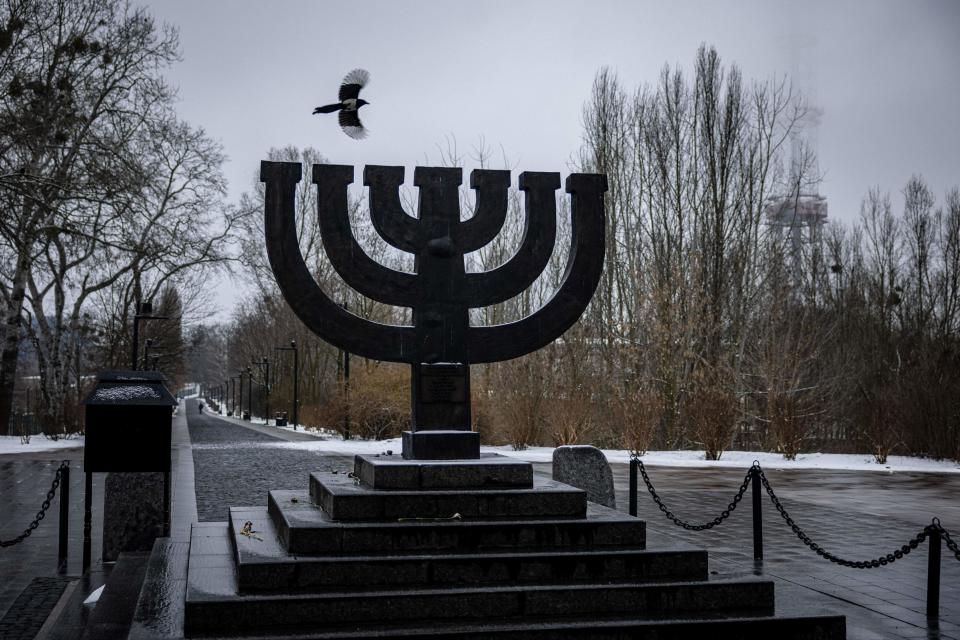Ghosts of Ukraine: Don't forget dark events preceding Ukraine's birth as free nation
Every day, the media is filled with the heroic stories of the people of Ukraine struggling to defend their homeland from Russian aggression. Like most Americans, I wholeheartedly support Ukraine in its defense of its fragile democracy, but we should not forget the dark events in the 20th century that preceded the breakup of the Soviet Union in 1991 and the birth of Ukraine as a free nation.
I feel a personal connection to this ongoing horrible tragedy because of my family. Both of my parents emigrated to the USA in the late 1930s from what was then eastern Poland. Following the invasion of Poland by the Nazis in September 1939, their homeland became part of Ukraine from the division of Poland by the nonaggression treaty between Nazi Germany and the Soviet Union.
My parents were Jews who both came from small towns in the region of the Carpathian Mountains south of the big metropolis of L’viv. I remember from my childhood that my parents would usually refer to this regional capital by its Yiddish name of Lemberg. Before the Second World War, Ukraine was home to a huge Jewish population.
Sadly, estimates are that in the neighborhood of 1.5 million Ukrainian Jews perished in the Holocaust, second only to the victims from the Jewish population of Poland. Many of these Jews did not die in Nazi concentration camps; rather, they were victims of what has been referred to as the “Holocaust by bullets.” Testimony of the few living survivors is still being documented by the United States Holocaust Museum in Washington, D.C.
To understand what happened in Ukraine during the time of WWII, it helps to know the long, often contentious history of the relations between Ukraine and Russia. Ukraine traces its identity to the 800s when Viking settlers established dominion over the local Slavic peoples, founding the territory of Kievan Rus’, from which the name Russia is derived.
After falling to Mongol invaders in the 13th century, parts of Ukraine were eventually annexed by Lithuania, Poland and Imperial Russia. After the Bolshevik Revolution of 1917, Ukraine experienced a brief, chaotic period of independence before being assimilated by the Soviet Union in the early 1920s.
During the early 1930s, the Ukrainian people experienced a famine that killed anywhere from 3 million to 6 million people, which was the direct result of the confiscation of most of the grain harvest by the Soviet authorities. Memory of this famine, called the Holodomor in the Ukrainian language, resulted in large numbers of Ukrainians embracing the invading Nazi troops as liberators during the invasion of the Soviet Union in June 1941.
As an example, many Ukrainians participated in the Nazi massacre of over 30,000 Jews in September 1941 in Babi Yar, outside of Kyiv. During the years of the Soviet Union, the authorities refused to recognize this slaughter, causing the dissident Soviet poet Yevgeny Yevtushenko to pen "Over Babi Yar there are no monuments," later set to music in the 13th Symphony of Dimitri Shostakovich, a Soviet composer who had also fallen out of favor with the Kremlin on more than one occasion. Ironically, the monument to the victims of Babi Yar that was finally erected by Ukraine after the fall of the Soviet Union was struck by Russian shelling this past March.

Many of my family members perished in the Holocaust. Most of the members of my mother’s family did not survive, and likely died in a Nazi extermination camp. However, my father had a brother, my uncle Avram, who was initially lucky: He evaded the roundup of most of the Jewish population of southwest Ukraine by the Nazis after the invasion. Instead, he was betrayed and murdered late in the war by the local populace, never to be reunited with the few surviving members of our family.
My father actually was able to find people who were still in the area around the time of his brother’s murder who could identify the perpetrators. However, he was never able to achieve any justice, even trying unsuccessfully to petition the ambassador of the Soviet Union to the United Nations in the 1950s.
I am reminded of the Holocaust every day by seeing the people around me, who are usually blessed with large families, where having living grandparents, uncles and aunts, and cousins is the norm. Beside my parents and sister while growing up, I only had a dearly beloved maternal aunt, who fulfilled the role of my dead grandparents.
There are many more American Jews who can trace their family histories to Ukraine, and some share a similar story. The director Steven Spielberg, Senate Majority Leader Chuck Schumer, the late actor Leonard Nimoy and the late conductor Leonard Bernstein all have family roots in Ukraine.
The current president of Ukraine, Volodymyr Zelensky is Jewish, and there are Jews among the Ukrainians that are now fighting and dying trying to defend their homeland. Let us remember the Jewish dead of the Holocaust from Ukraine, but let us also support the current struggle of the people of Ukraine for peace and freedom. All of Ukraine deserves our support.
Charles H. Bush, M.D., is a clinical associate professor in the musculoskeletal imaging division of the department of radiology in the University of Florida College of Medicine.
Join the conversation
Share your opinions by sending a letter to the editor (up to 200 words) to letters@gainesville.com. Letters must include the writer's full name and city of residence. Additional guidelines for submitting letters and longer guest columns can be found at bit.ly/sunopinionguidelines.
Journalism matters. Your support matters.
Get a digital subscription to the Gainesville Sun. Includes must-see content on Gainesville.com and Gatorsports.com, breaking news and updates on all your devices, and access to the eEdition. Visit www.gainesville.com/subscribenow to sign up.
This article originally appeared on The Gainesville Sun: Charles H. Bush: Don't forget the impact on the Holocaust on Ukraine

